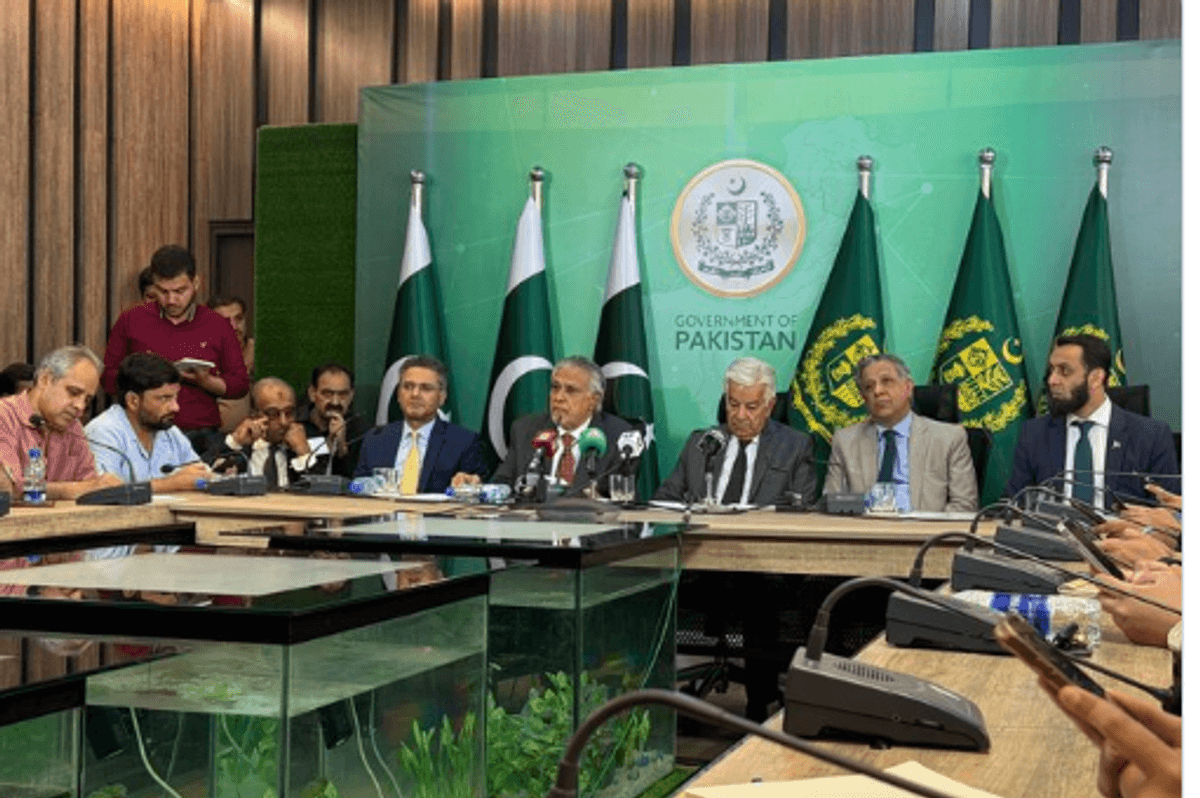India planning ‘attacks in multiple cities’ after Kashmir incident, warns Pakistan
If New Delhi carries out attacks in our cities, it will be tit for tat and we will make them pay, Defense Minister Khawaja Asif warns
News Desk
The News Desk provides timely and factual coverage of national and international events, with an emphasis on accuracy and clarity.

Pakistani ministers addressing a press conference in Islamabad on April 24, 2025.
Courtesy: PTV
Pakistan's top ministers on Wednesday warned of forceful retaliation if India carries out terrorist attacks on Pakistani soil in the aftermath of deadly Pahalgam attack, alleging that New Delhi is plotting acts of sabotage and harboring armed foreign combatants in Indian administered Kashmir.
In a press conference following the National Security Committee (NSC) meeting, Defense Minister Khawaja Asif said Pakistan had credible intelligence that India was planning attacks in multiple cities.
“If India conducts acts of terrorism in our cities, it will be tit for tat and we will make them pay,” Asif said.
Foreign Minister and Deputy Prime Minister Ishaq Dar took the allegations further, claiming Pakistan has substantial evidence that India is facilitating the movement and activity of “foreign nationals” in Srinagar. According to Dar, these individuals are armed and manufacturing improvised explosive devices (IEDs) for use by terrorist groups.
“Indian intelligence agencies have brought these foreign combatants to Srinagar,” Dar said. “They are heavily armed and are exporting IEDs to terrorist entities.”
Dar also accused India of playing a double game in the region. “India has a habit of blaming Pakistan without evidence. If they have any, they should share it. We, however, have proof [of movement of foreign nationals] and are monitoring the situation closely,” he said.
The deputy prime minister added that insurgents from groups like the Balochistan Liberation Army (BLA) and Tehreek-e-Taliban Pakistan (TTP) have found shelter in India and even receive medical treatment there.
"India’s footprint is clear in what the BLA is doing, and what is happening in Afghanistan,” Asif added.
The remarks come amid rising tensions following an attack in India’s Pahalgam area. Following the incident, New Delhi announced suspending the Indus Waters Treaty — a key water sharing agreement between the two countries.
The Pakistani officials also addressed the growing dispute over water resources. Dar warned that any attempt by India to suspend the Indus Waters Treaty would be considered an “act of war.”
“This is a matter of survival for 240 million Pakistanis. Any encroachment will not be acceptable,” Dar said. “We will take all necessary actions, including suspending the Simla Agreement.”
He confirmed that Pakistan would inform the World Bank, which acts as a guarantor of the 1960 treaty, about what he described as India’s “reckless” statements.
No mention of Indus Waters Treaty in démarche
Dar also noted that there was no mention of the Indus Waters Treaty in the démarche handed over to Pakistan High Commissioner in New Delhi.
Asked whether Pakistan would consider a military response to such a move, Dar stopped short of direct confirmation but said the matter was serious enough to warrant the “act of war” terminology.
The foreign minister reiterated Pakistan's commitment to diplomatic channels but emphasized that the country’s posture would remain “one notch above” India’s actions.
“This is not about escalation. This is about deterrence and defense,” Dar concluded.
Meanwhile, India’s Chargé d’Affaires Geetika Srivastava was summoned to Pakistan's Foreign Office and handed a formal demarche.
Pakistan conveyed its retaliatory decisions in writing, diplomatic sources confirmed.
Tensions rise
Tensions between India and Pakistan escalated sharply after gunmen killed 26 people — all Indian nationals except one Nepali — in the deadliest civilian attack in the Himalayan region in over two decades.
The assault took place on Tuesday in the popular tourist town of Pahalgam, where visitors were enjoying serene mountain views when gunmen emerged from nearby forests and opened fire with automatic weapons.
The Indus treaty, mediated by the World Bank and signed in 1960, regulated the sharing of waters of the Indus River and its tributaries between India and Pakistan. It has withstood two wars between the neighbors since then and severe strains in ties at other times.
Diplomatic relations between the two countries were weak even before the latest measures were announced as Pakistan had expelled India's envoy and not posted its own ambassador in New Delhi after India revoked the semi-autonomous status of Kashmir in 2019.
Tuesday's attack is seen as a setback to what Modi and his Hindu nationalist Bharatiya Janata Party (BJP) have projected as a major achievement in revoking the special status Jammu and Kashmir state enjoyed and bringing peace and development to the long-troubled Muslim-majority region.
Some Kashmiri groups in Jammu and Kashmir have been fighting for independence. Tens of thousands of people have been killed in Kashmir since the uprising began in 1989.
Indian Prime Minister Narendra Modi condemned the “heinous act” and vowed justice. Speaking at a rally in Bihar, Modi folded his hands in prayer to honor the victims, urging the crowd to do the same.
“We will pursue them to the ends of the earth,” Modi said, referring to the perpetrators.







Comments
See what people are discussing